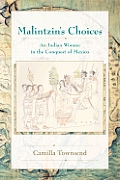 Ortho at Baudrillard’s Bastard has tagged me on a bit of bloggy fun. Here are the rules:
Ortho at Baudrillard’s Bastard has tagged me on a bit of bloggy fun. Here are the rules:
1. Pick up the nearest book ( of at least 123 pages).
2. Open the book to page 123.
3. Find the fifth sentence.
4. Post the next three sentences.
5. Tag five people.
I picked up Malintzin’s Choices: An Indian Woman in the Conquest of Mexico by Camilla Townsend (2006). Here are the selected 3 sentences on p. 123:
“About the same time as the students of the Franciscans were interviewing elderly men who remembered the battle for Tenochtitlan, other friars were supervising the transcription of some of the old Nahuatl songs that had come down through the years. For centuries, the songs had evolved with each new generation; they were malleable, constantly reflecting the new experiences of the singers and their audiences. By the 1550s and 1560s, many of them contained references to the Christian god and to other elements of life with the Spanish.”
Not coincidentally, this is a woman’s biography–have any of you out there read it yet? Any thoughts? I’m considering it for my early American women’s history class in the fall, and for a historiographical essay I’ve agreed to write.
I liked it. That helps, I know. I’m full of deep thoughts today.
LikeLike
I haven’t read it; I enjoyed reading her her book “Pochantas and the Powhatan Dilema” in your Americn Women’s History class Fall of ’06. As I recall, it was a easily readable book that was able to incorporate a lot of broad themes.
Oh and I didnt get a chance to post this on Tuesday (I blame my two reading seminars) but I also think that Katie Roiphie’s “research” is complete nonsense. Although it is scary some of the public finds her arguments convincing. Its a shame that educated females still promote this ideas-I’m thinking particulary of the splash Louann Brizendine made in her book “The Female Brain.” Makes me think anyone supporting gender spheres can write their conclusion before they’ve started researching these days and get it published.
LikeLike
I’ll add it to my “read next” list. I don’t always get to books on this list, but Malintzin’s Choices looks to be a nice addition to other texts I’m reading at present: Hugh Thomas, Conquest and Victor Hanson, Carnage and Culture.
LikeLike
James and Ari–you both have admirably eclectic reading habits!
Mary, take note: it’s MUCH easier to get a big book contract if 1) you’re the daughter of a famous feminist writer, and 2) you argue that feminism is harmful to young women. A young woman like you writing a book about how feminism is great and helpful and shapes your life in important ways is not what the market wants to hear, so remember, you’re looking for the man bites dog story. (Or the fish rides bicycle story, as it were? You don’t even get that joke do you, because you’re 22?!?)
LikeLike
Nope. I can’t say that I have ever heard of bicycle riding fish-nor can I claim to be 22 for another six months. Although it is flattering everyone thinks I am so old these days.
LikeLike
I always thought it was Florynce Kennedy, but this
http://www.phrases.org.uk/meanings/414150.html
says it was Irina Dunn.
LikeLike
Excellent, Rootless–I always thought it was Steinem, so thanks for schooling us all. Very clever of you!
LikeLike
I read Malintzin’s Choices this past summer after being rightly taken to task for neglecting the perspectives of Mexican women in a paper that attempted to imagine (following Armitage) a Mexica Cis-Atlantic. I learned a lot from Malintzin’s Choices and imagine that it would work well in an undergraduate classroom.
Catalina De Erauso’s Lieutenant Nun: Memoir of a Basque Transvestite in the New World might be a nice addition to your class’ reading list. Erauso could move the course further south into colonial Peru and help spark discussion of the cultural construction of gender identities in 16th- and 17th-century Spanish America.
I give you kudos for constructing an early American course that does not focus exclusively on North America. Unfortunately, in my department, our “colonial” Americanist focuses exclusively on British North America within a teleological “Early American” framework–as a prologue to the U.S. nation.
Once you write your syllabus, will you share it with us?
LikeLike
Ortho–thanks for the recommendation on the Erauso book–it sounds even more up my alley! And thanks for the kudos too, but when you do gender you have to cast a wider net to fill out a syllabus. My own work right now focuses in part on New France, and I’ve really learned a lot from various Mexican and other Latin American titles.
LikeLike
Pingback: Jacking the internets for the forces of evil! | Historiann